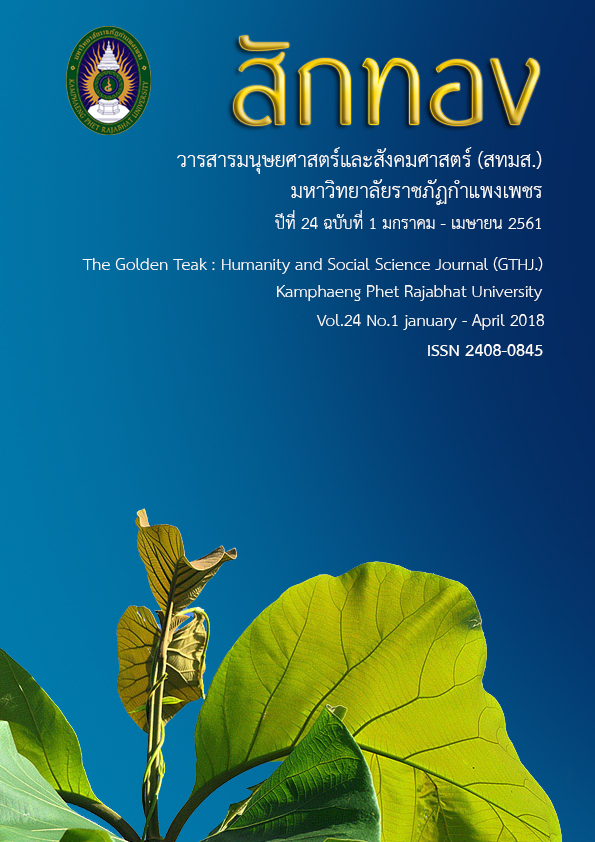The Administration of Leaders According to the Theory of Public Administration
Main Article Content
Abstract
The purposes of this study are to study of the administration of leaders according to the theory of public administration. The research was survey research. Data were collected by 152 leaders’ questionnaires to show the factors for administration of leaders. And data were analyzed statistically by using statistical package program, using descriptive statistic which average, and standard deviation .The instruments used were Likert's rating scale questionnaire and Cronbach's reliability coefficient (a= 0.86). The research results found that the administration of leaders according to the theory of public administration overall was at a high level ( =3.65, S.D =0.76). Considering each aspect, found the organizational balanced control was at a high level. The focus on moral practice was at a moderate level. Comparison the administration of leaders according to the theory of public administration by sex and age as a whole and individual aspects were not difference. The comparison by educational level overall was not different but when classifying it found the strategic direction was different. Also if comparison by experience overall was not different but classifying it found that promotion organizational culture was different, statistically significant at the 0.05 level.
Article Details
บทความที่ได้รับการตีพิมพ์เป็นลิขสิทธิ์ของวารสาร สักทอง : วารสารมนุษยศาสตร์และสังคมศาสตร์ สถาบันวิจัยและพัฒนา มหาวิทยาลับราชภัฏกำแพงเพชร
ข้อคิดเห็นใดๆ ที่ปรากฎในวารสารเป็นวรรณกรรมของผู้เขียนโดยเฉพาะ ซึ่งมหาวิทยาลัยราชภัฏกำแพงเพชรและบรรณาธิการไม่จำเป็นต้องเห็นด้วย
References
Bartol, Kathryn M. (1998). Management. (3 rd ed.). New York : McGraw-Hill.
Bass, B. M. (1997). New Paradigm of Leadership : An Inquiry into Transformational. New York : Free press.
Beungmum, P., Chaowakeeratiphong, T. & Chamjang, K. (2015). Development of Management Strategy for Mobilization of Educational Resources of Schools under Kamphaeng Phet Primary Educational Office Area 1 and 2. The Golden Teak : Humanity and Social Science Journal (GTHJ.) [Online Serial], 21, (3). Available : http://research.kpru.ac.th/old/Joumal_HSS/images/TGT/2558/pats3/3-15-58.pdf [2017, June 27].
Chaiaroon, M. Khantaprab, T. & Sukhabanij, K. (2014). The Globalized Educational Leadership and Intelligent Organization Management Strategy for the Sustainable Human Resource Development of the Faculty Administrators of Rajamangkala University of Technology, Science and Technology section. The Golden Teak : Humanity and Social Science Journal (GTHJ.) [Online Serial], 20, (3). Available :https://www.tci-thaijo.org/index.php/tgt/article/view/28413 [2560, June 2].
Chantasorn, V. (2008). Theory of Implementing the Policy. Bangkok : Prikwaan Graphic.
Chitsawang, N. (2013). Describe the desired public administration theories. [Online]. Available : https://www.gotoknow.org/posts/468582 [2017, June 27].
Cronbach, L.J. (1951). Coefficient Alpha and the Internal Structure of Tests. Psychometrika, 6(3), 297-334.
Frederickson & Smith. (2003). The Public Administration Theory Primer. quoting, Nathee Chitsawang. (2013). [Online]. Available : https://www.gotoknow.org/posts/468582 [2560, มิถุนายน 2].
Khon-Chalard, K. (2005). Leadership. Chonburi : Burapha University.
Krejcie, R.V. & Morgan, D.W. (1970). Determining Sample Size for Research Activities. Educational and Psychological Measurement, 30(3), 607-610.
Leatrangsri, B. & Onkeaw, M. (2007). Compass leader. Bangkok : Chandee Creation.
Likert, R. (1932). A Technique for the Measurement of Attitude. New York : New York University.
Pamela S. Lewis. (2004). Management Challenges For Tomorrow ‘s Leaders. (4 th ed.). Thomson South Western.
Sathien-Kong, J. (2014) Strategies of success in Thai government management. Philosophy of Dissertation, College of Public Administration Burapa University.
Sila, K. (2013). A study of creative leadership of administrators’ school under Bangkhen Office in Bangkok, Master Thesis, Srinakharinwirot University.
Shingveng, N. (2014). Strategic leadership study on personnel achievement management. Phitsanulok Municipality Phitsanulok Province. Master Thesis, Pibulsongkram Rajabhat University.
Shuntharayut, T. (2008). Management of change. Bangkok : Natipong Printing.
Srisaaad, B.C. (2013). Preliminary research. (6 th ed). Bangkok : Suviriyasarn.
Stephen K Bailey, (1968). Objective of the Theory of Public Administratio. in J. Charles Worth. ed. Theory and Practice of Public Administration. Philadelphia : American Academy of Political and Social Science.
Thavornwongsakul, J. (2011). A study of management paradigms that affect performance. Workforce Level 2-7 of Provincial Electricity Authority. Thesis Master of Public Administration, Silpakorn University.
Thee-Asana, S. (2014). New Quality Management Techniques : Concepts, Principles, Quality Management. (2 nd ed). Mahasarakham : Mahasarakham Rajabhat University.
Thornramaruk, T. (2013). Model of Strategic Leadership Development of School Administrators Under Office of the Basic Education Commission. Doctor of
Philosophy, Burapha University.
Waraphin, C. (2014). New leadership features with professional management competencies of the Permanent Secretary in the Central Region. Philosophy of
Dissertation. Valaya Alongkorn Rajabhat University under the Royal Patronage.
Wongrattana, C. (2007). Statistical techniques for research. Nonthaburi : thainaramitkit Interprocessive.

